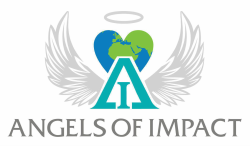|
On the 11th of July, we were invited to BlackRock to share more about our work. In her speech, our Co-Founder, Laina Raveendran Greene, posed three overarching questions: why are we targeting poverty, why are we targeting women, and why social entrepreneurship? To answer the first question, Laina explained that poverty is often the root cause of many other problems, such as corruption or gender inequality. She also discussed how many businesses, such as fast fashion or fast food, often exploit the poor—when we purchase a new scarf at a great deal, how often do we stop and wonder how exactly that low price came about? The best way to combat that problem, then, is to spend your dollars on sustainable businesses instead, and A.I. has made it easy by bringing sustainable, responsible products directly to your doorstep. As for the second question—why target women—Laina urged the audience to close their eyes and think about poverty. The image that often pops up in your mind is that of a woman sitting at the side of a street, holding in a child in her arms and begging. Although we have achieved the U.N. Millennium Development Goal of halving extreme poverty, the majority of people still living in poverty today are women. This is because women are often the “invisible infrastructure” of the community: they are the ones who carry water, look after children, take care of subsistence farming, and so on. As a result, women are often left behind when new opportunities arrive. While women been left behind in the fight to eradicate poverty, data has now shown that women also make good investments. When you help a woman, you don’t just help a single individual; you also help her family and her community. Furthermore, according to Forbes, women entrepreneurs bring in 20% more revenue with 50% less money invested. In other words, investing in women is not just the right thing to do—it’s also the smart thing to do. However, there also exists an unconscious bias that women can only receive micro-finance. Although women have graduated from micro-finance, investors for the most part, have not seen how they are now ready for larger funds. As such, A.I. works to educate people, helping them to move beyond micro-finance and to support social enterprises to grow and scale. This brings us to our third question: why social entrepreneurship? Prof Yunus in his book "Creating a world without poverty" has clearly shown that we need to move beyond charity. Meanwhile, Richard Branson, states that the brands that will thrive in the years to come are the ones that have purpose beyond profit. These companies are not only more sustainable, but also help to create a more just society. A.I. recognises that the most sustainable way of to make an impact is through social entrepreneurship, and not charity or donations. However, the problem with many social enterprises is that they are too big for small loans, yet also too small for impacted investors at the same time. As a result, they end up stuck in a chasm that the Monitor Group in their report "From Blueprint to Scale" calls the “pioneer gap”.
A.I. has a pool of women social enterprises that they support that are at the cutting edge of this new kind of business. Laina raised the example of Krakakoa, which works directly with smallholder farmers in Indonesia for bean-to-bar chocolates. This allows farmers to move up the value chain, thereby getting out of poverty. A.I. has been working with them to help flow funding and open doors for sales to help them cross this chasm. Laina then urged the audience to donate their most precious resource of time and: their business-related skills. As a corporate, these skills are invaluable in helping social enterprises to succeed. Apart from volunteering skills, we can also directly fund these enterprises through investments and to support them by simply buying their products, be it as a personal or corporate gift. Laina ended the speech by recalling the words of Prof Muhammed Yunus: that poverty can be ended. If we all do our part, we can put poverty in the museums. Together in unity, we can, in fact, end poverty. |
Angels of Impact A.I.Receive thought leadership, news, updates and events activities Archives
July 2017
Categories |





 RSS Feed
RSS Feed